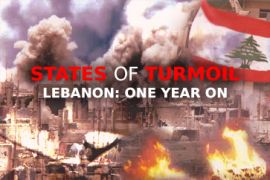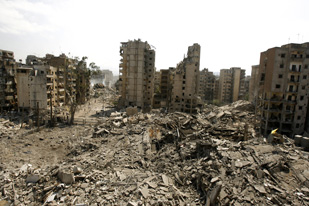Lebanon: One year on
Al Jazeera looks at the effects of last year’s war on the Middle East and beyond.

 |
| Lebanon has struggled to rebuild from last year’s war [AFP] |
On July 12, 2006 the first Israeli rockets struck Beirut’s southern suburbs and its airport.
On 14 August, 34 days later, a UN-brokered ceasefire went into effect and finally, on September 8 hostilities formally ended when the naval blockade of Lebanon was lifted.
One year on from the war in Lebanon Al Jazeera is running a series of special reports on how an intense month of fighting last summer had, and continues to have, a profound effect on the entire region.
The conflict officially involved the Israeli military and Hezbollah, but throughout the region it had profound implications on other nations, governments, political parties and their leaders. And in virtually every case, the war damaged them all.
| Special report | ||||
|
In Israel, the government of Ehud Olmert has come under significant criticism both from the international community but also from within his own country.
Earlier this year, the Winograd Commission issued its interim report into the actions of the Israeli government last year. The conclusions were extremely critical of Olmert for lacking “judgement, responsibility and prudence” in opting for war in the first place.
Olmert’s popularity has sunk and the final draft of the report, now expected in October could yet bring down his government.
Within Lebanon, the country’s infrastructure was severely damaged, and around 1,000 people were killed, the majority of them civilians.
Weaker positions
According to the UN, 30 per cent of those who died were children under the age of 12 and with many unexploded munitions remaining in the south of the country hundreds of thousands of people remain displaced.
|
|
Hezbollah itself suffered significant casualties and although it is considered to be well armed and supplied it has been weakened.
Hassan Nasrallah, its leader admitted to the Lebanese people that had he known of the extent of the damage caused by the war, he never would have instigated it.
However, the position of the Lebanese government itself was also damaged and late last year hundreds of thousands of followers of Hezbollah and its supporters staged mass sit-ins, demanding the resignation of Fouad Siniora as prime minister.
Siniora remains in office but fears of a weakened leadership in Lebanon led Jordan’s King Abdullah to warn, late last year, that 2007 could see three civil wars in the region: in Iraq, in the Palestinian territories and in Lebanon.
During the war itself, western leaders came under significant international criticism for not doing more to stop the violence by demanding a ceasefire.
As Tony Blair, the former British prime minister, returns to the region as a Middle East envoy criticism is already mounting that he lacks the impartiality needed to make any significant advances toward peace.
Other nations in the region, most notably Syria and Iran played roles in the conflict as well. They too, share some responsibility for how events played out.
